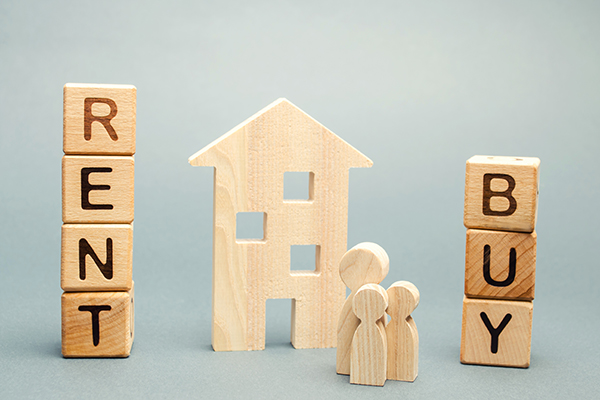Choosing whether to rent or own a home is a big decision. Both arrangements have advantages and disadvantages, pluses and minuses, and pros and cons. A lot of the decision depends on your particular financial situation, and whether you plan to stay in particular geographical area long-term. Some of the decision depends on your lifestyle and desires, which may change as time goes on.

Renting A Home
Renting a home has some distinct benefits for many people. Oftentimes, initial expenses may be lower as a down payment isn’t needed. Keep in mind that a deposit is often required to rent a property, but that amount may be refundable in many cases, per the lease agreement terms. Be sure to compare monthly rental costs with monthly mortgage payment amounts for similar square footage.
Another big advantage of renting is that maintenance of the structure, systems, and appliances is usually handled by the landlord, freeing residents from those worries and expenses. Usually, when a repair is needed, all that is required of a renter is picking up a phone and reporting the problem. This makes monthly and yearly expenses largely predictable, which can make budgeting easier. Additionally, renters are not usually responsible for paying property taxes or home insurance, although they may choose to have rental insurance coverage for their belongings.
When a rental lease is up, occupants are free to move with no worries or pressure that can come with putting a home on the market to sell. Renters are also largely free of concern about real estate prices or mortgage rate fluctuations beyond how those financial indicators may affect the general economy. Resale value is usually not a concern, either.
Owning A Home
One of the main advantages of home ownership is that owners have the opportunity to build equity as the mortgage principal is paid. This can make home ownership a good long-term financial investment in many cases, especially when real estate retains or increases its value. There may also be some tax advantages with potential mortgage interest and property tax deductions, although each individual should consult their tax professional to see how they would be affected.
Outside of financial considerations, owning a home can be a point of pride from some people. Having something of their own to care for and to improve over time can bring satisfaction and pleasure, especially for do-it-yourself types. Many homeowners choose to invest in home improvements to help increase a home’s resale value as well as to make the home more livable and enjoyable.
One of the downsides of home ownership is that expenses may not be predictable. In addition to planning for long term maintenance and improvements, such as roof replacement and HVAC upkeep, homeowners must be financially prepared for the inevitable unexpected repairs and replacements of home systems and components that aren’t covered under most home insurance home plans.
One way to protect your home ownership investment and your household budget is to have an HSA Home Warranty, a service contact that can help safeguard against the cost of covered repairs or replacements for some home systems and appliance components that fail due to normal wear and tear. HSA offers comprehensive home warranty plans that add valuable protection, convenience, and peace of mind for homeowners across the country. An HSA Home Warranty can also help safeguard home sellers and buyers alike for the expenses of covered mechanical and appliance failures during and after real estate transactions.